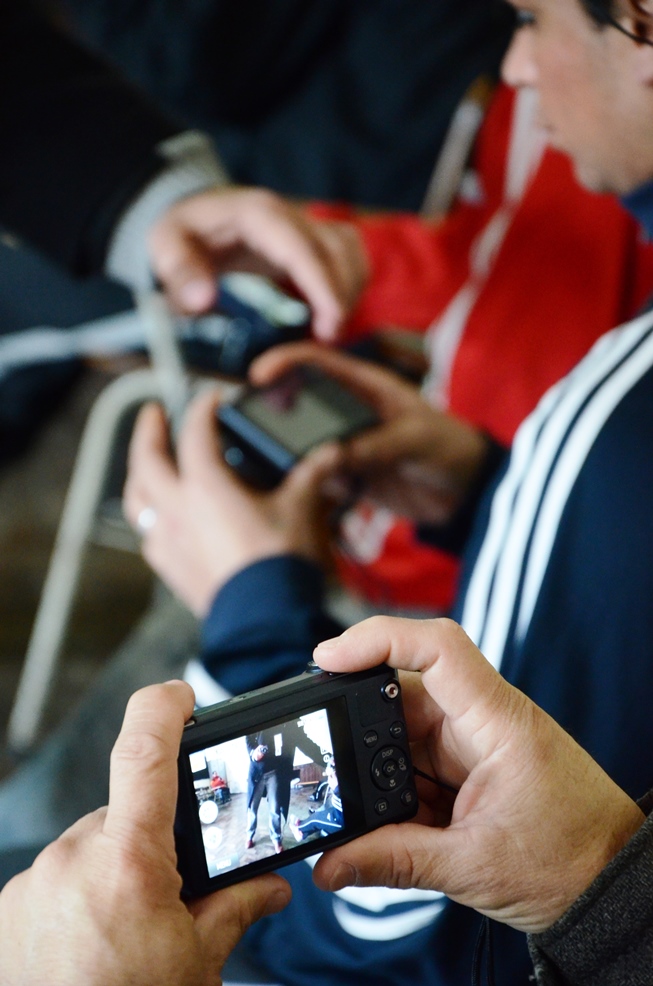Photography workshops in prisons spark dialogue on human rights, gender, health and violence in prison settings

|
| Inmates at Porto Alegre's Central Prison learn how to use a camera |
Porto Alegre, 2 October 2013 - "It felt like we were free", said a young pregnant woman, imprisoned at the Madre Pelletier Female Penitentiary, after the first day of a photography workshop held there by the United Nations Office on Drugs and Crime (UNODC), in partnership with the Ministry of Health and SENAC/RS, and with support from the European Union Delegation in Brazil.
The other 13 participants of the workshop - among them prisoners and prison staff of the health, administration, security and social assistance departments - agreed with that impression. Life, solidarity, knowledge, freedom, fun, creativity and inspiration were some of the words chosen by the group to represent that day.
The photography workshop at the Madre Pelletier Penitentiary was only the first activity of a new project of the UNODC Liaison and Partnership Office in Brazil, which aims to develop a methodology for raising awareness and building capacity on human rights in prisons. The idea is to use images that depict everyday situations of vulnerability related to the promotion and/or violation of human rights in prisons in order to promote a discussion on the subject, focusing on gender, violence and health issues, specifically the prevention of AIDS, viral hepatitis and tuberculosis.

|
| Prisoner photographs the maternity at the female penitentiary |
The project begins with a two-day photography workshop, in which participants have the chance to express their views on the prison environment by capturing images that represent the perceptions and feelings of those who live the everyday life of Brazilians prisons. The activities involve both prisoners and professionals working in prisons, to promote the exchange of experiences between these two groups that share specific internal spaces every day, but with radically different perspectives and roles.
On the first day of the workshop, participants learn the basics of photography and receive digital cameras to photograph any place, object or person that has meaning for them, within the environments in which they live, work and circulate in prisons. "We were able to use the pictures to show our feelings, our joys and sorrows, to photograph images that show these moments we have. Most of the photos taken today were joyful, it doesn't look like they were taken at a prison", said another prisoner at Madre Pelletier, also pregnant. On the second day of the workshop, participants analyze and pick their photos.

|
|
Inmate registers his place of work in the prison's administrative area
|
Besides the female penitentiary, the male Central Prison of Porto Alegre also received the project's first photography workshops, held between late August and early September. At the Central Prison, participants were divided in two groups: one for prison staff and another for prisoners, including a representative of the specific wing for gays and transvestites. At the end of the first day, one of the inmates commented on the ludic aspect of the workshop: "We have very strict daily habits, this has broken our routine".
The images produced by the participants will be used in the project's second stage, which started this week at the two prisons in Porto Alegre, in south Brazil. In another two-day meeting with the participants, a discussion about human rights is held based on the selected photographs, which will serve to open up a space for dialogue about the relations and perceptions between imprisoned persons and prison staff, approaching concepts and guidelines on issues related to gender, vulnerabilities, health promotion, disease prevention and violence.

|
| Dentist photographs the external area of Porto Alegre's Central Prison |
Moreover, the collection of photographs resulting from the workshops may be presented at exhibitions in the participating penitentiaries. UNODC also hopes to take the project to prisons in other Brazilian states.
Within the Ministry of Health, the workshops are supported by the Department of Sexually Transmitted Diseases (STD), AIDS and Viral Hepatitis, the National Program for Tuberculosis Control and the Technical Area of Health in the Prison System.
The initiative also has a partnership with the Center for Professional Education of SENAC/RS, SUSEPE and the Municipal Program on STD/AIDS.
This activity is also part of the United Nations Integrated Plan to address the HIV/AIDS epidemic in the city of Porto Alegre - AIDS Tchê.
Related information
Guide about gender, HIV/Aids, coinfections in prison settings (in Portuguese)